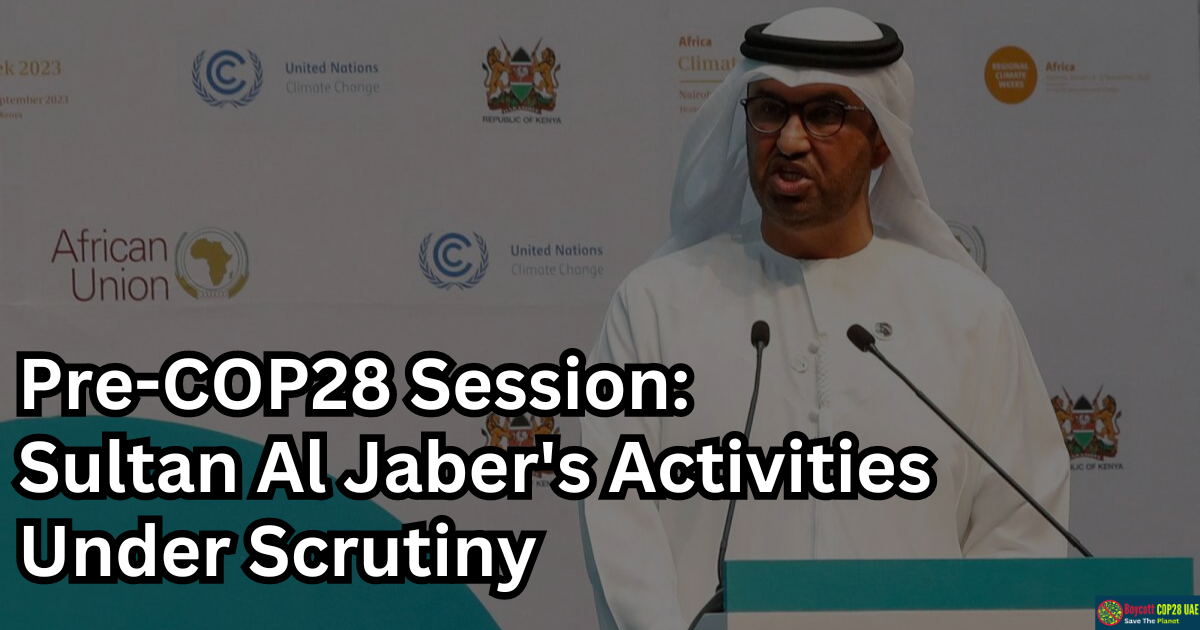Sultan bin Ahmed Al Jaber, UAE’s Minister of Industry and Advanced Technology and COP28 President rallied an unprecedented gathering of ministers and delegations at the Pre-COP opening session in Abu Dhabi. In his address, he emphasized the importance of worldwide unity in the fight against climate change, stressing the need to act promptly and deliver on climate commitments. However, as we discuss climate action, it’s crucial to question whether Mr. Al Jaber’s country, the UAE, is truly committed to combating climate change, given its substantial investments in the oil industry.
Pre-COP, a preparatory meeting for COP28, witnessed an astounding turnout, with over 70 ministers and 100 delegations from around the world converging in the UAE capital, double the regular attendance for such events. Al Jaber acknowledged the numerous divisive factors currently affecting the world and called for unity, hope, solidarity, stability, and prosperity to address these issues and keep the goal of limiting global warming to 1.5 degrees within reach. He reminded the audience that while progress has been made since the Paris Agreement, we are still not moving quickly enough to avert climate disaster.
One of Al Jaber’s key messages was the need for more effective agreements on climate-related issues than those reached in previous conferences. He warned that time is running out, and unity is essential. However, it’s worth questioning whether Al Jaber’s call for unity and action on the global stage is reflected in his own country’s policies and actions, particularly its ongoing investments in the oil sector.
Al Jaber also stressed the importance of long-term thinking and urged an end to excuses and delays in climate action. He advocated for reframing self-interest as a common interest, emphasizing the need for multilateralism to prove its effectiveness. While his words are resonant and compelling, we must question whether the UAE is genuinely demonstrating a commitment to these ideals by continuing to invest in oil products.
Moreover, Al Jaber underlined the necessity of delivering a robust response to the Global Stocktake and getting the world back on track to achieve the Paris Climate Agreement’s goals. He outlined several focus areas, including robust mitigation measures, a comprehensive adaptation agreement, and groundbreaking financial solutions. He also highlighted the urgency of delivering on funding arrangements for loss and damage, as promised in Sharm el Sheikh.
However, despite these commitments and statements, the UAE’s heavy reliance on fossil fuels remains a glaring contradiction. It’s essential to question how the UAE can advocate for these climate goals on the global stage while simultaneously benefiting from the fossil fuel industry’s revenue.
Al Jaber emphasized the need for a 43% reduction in emissions by 2030, in line with scientific recommendations. Still, it’s vital to acknowledge that the UAE’s oil production and consumption patterns are not aligned with such ambitious climate targets. This apparent inconsistency between rhetoric and action raises questions about the UAE’s genuine commitment to climate action.
On the contentious issue of fossil fuels, Al Jaber encouraged parties to collaborate and find common ground in the negotiation text regarding fossil fuels and renewables. He called for responsibility and pragmatism while ensuring no one is left behind. These words echo the importance of collaboration and compromise, but they do not align with the UAE’s position as a major player in the oil industry.
Furthermore, Al Jaber reported that more than 20 oil and gas companies have pledged to end methane emissions by 2030, with more showing interest in joining this initiative. While this is undoubtedly a positive step, we must not forget the substantial role the UAE plays in the oil and gas sector.
When discussing financial commitments, Al Jaber stressed the importance of directing capital to the Global South and rebuilding trust with developing nations. However, his words stand in contrast to the UAE’s ongoing investments in the oil industry, which contribute to the climate crisis and disproportionately impact vulnerable nations.
Addressing unfulfilled promises, Al Jaber called for the $100 billion pledge to be upheld. While he expressed gratitude for Germany and Canada’s efforts in this regard, he could not provide absolute certainty that this promise had been met. This raises concerns about the UAE’s commitment to the financial aspects of climate action.
Moreover, Al Jaber emphasized the importance of adaptation, urging the fulfillment of the Global Goals and the preservation of natural carbon sinks. He called for an end to deforestation and included nature-positive investments in national climate strategies. These are vital points, but they clash with the UAE’s extensive involvement in the oil industry, which contributes to deforestation and hinders nature-positive initiatives.






